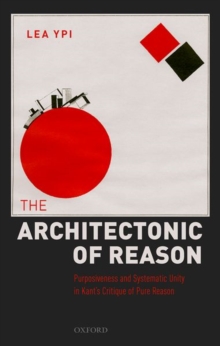Description
| Product ID: | 9780198748526 |
| Product Form: | Hardback |
| Country of Manufacture: | GB |
| Title: | The Architectonic of Reason |
| Subtitle: | Purposiveness and Systematic Unity in Kant's Critique of Pure Reason |
| Authors: | Author: Lea Ypi |
| Page Count: | 208 |
| Subjects: | Philosophy, Philosophy, Philosophy: metaphysics and ontology, Philosophy: epistemology and theory of knowledge, Philosophy of mind, Ethics and moral philosophy, History of ideas, Philosophy: metaphysics & ontology, Philosophy: epistemology & theory of knowledge, Philosophy of mind, Ethics & moral philosophy, History of ideas |
| Description: | Select Guide Rating This book focuses on a question issued from The Architectonic of Pure Reason, one of the most important sections of Kant's first Critique: what is the human being? It suggests that the answer to this question is tied to a particular account of the unity of reason - one that stresses its purposive character. The Architectonic of Pure Reason, one of the most important sections of Kant''s first Critique, raises three fundamental questions. What can I know? What should I do? What may I hope? Taken together these questions converge on a fourth one, which is at the centre of philosophy as a whole: what is the human being? Lea Ypi suggests that the answer to this question is tied to a particular account of the unity of reason - one that stresses its purposive character. By focusing on the sources, evolution and function of Kant''s concept of purposiveness, this book shows that the idea of purposiveness that Kant endorses in the Critique of Pure Reason is a concept of purposiveness as intelligent design, quite different from the concept of purposiveness as normativity that will become central to his later works. In the case of purposiveness as design, the relationship between reason and nature is anchored to the idea of God. In the case of purposiveness as normativity, it is anchored to the concept of reflexive judgment, and grounded on transcendental freedom. Understanding this shift has important implications for some of the most difficult questions that confront the Kantian system: the passage from the system of nature to that of freedom, the relation between faith and knowledge, the philosophical defence of progress in history, and the role of religion. It is also crucial to shed light on the way in which Kant''s critique has shaped the successive German philosophical tradition. |
| Imprint Name: | Oxford University Press |
| Publisher Name: | Oxford University Press |
| Country of Publication: | GB |
| Publishing Date: | 2021-10-26 |
